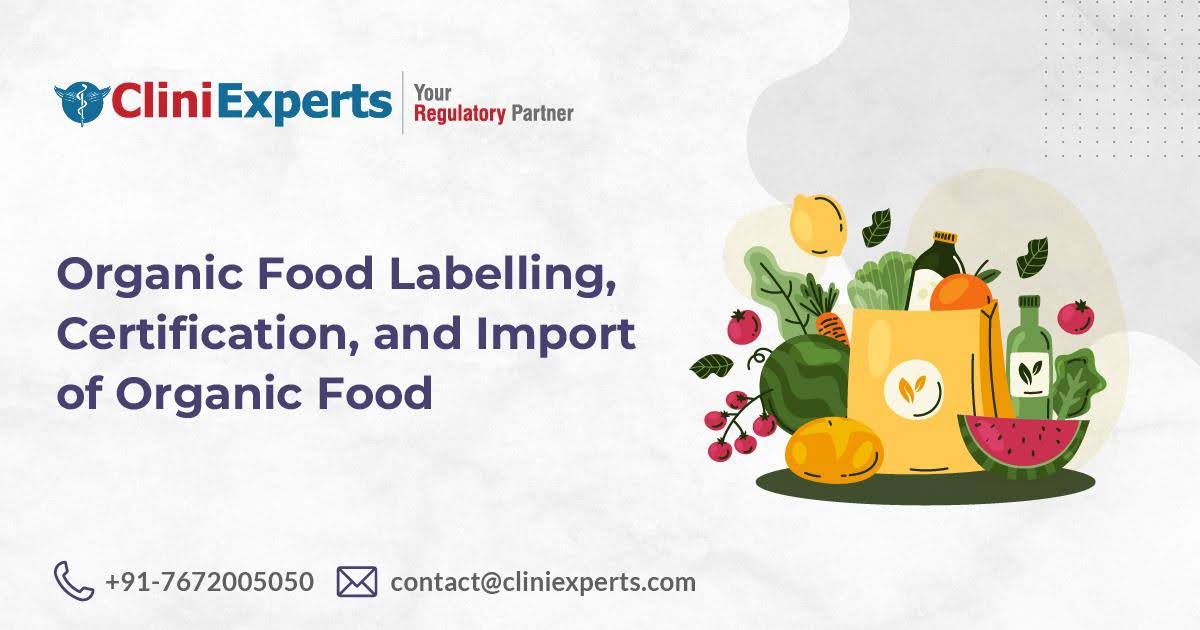Table of Contents
Organic Food Labelling In India| Certification, and Import of Organic Food in India

This Article is All About Organic Food Labelling In India and Certification, and Import of Organic Food in India. Explained in Detail About What is Organic Food labelling?
Summary
Table of Contents
- Organic foods are the products of holistic agricultural practices that emphasise environmental care, sustainability, and social responsibility.
- Food Safety and Standards Authority of India (FSSAI) is responsible for overseeing the production, distribution, sale or importation of “organic foods” in accordance with the regulations established in Section 22 of the Food Safety Standards Act, 2006.
- Consumers shall look for FSSAI’s Organic product logo “Jaivik Bharat” and FSSAI logo and License Number.
- The certification, labelling, and import of organic food products into India is regulated by the Food Safety and Standards (Organic Foods) Regulations, 2017.
Short Description
With an increased focus on health and wellness, consumers are reaching out more for shelves with “Organic” “100% Organic” “Natural” and more. To ensure organic foods marketed to consumers are safe, FSSAI plays a major role in regulating and overseeing the authenticity and compliance of such foods through organic food labelling, certifications, and import regulations. The labelling and certification of organic food in India is regulated by the Food Safety and Standards Authority of India (FSSAI) and the Agricultural & Processed Food Products Export Development Authority (APEDA).
What Is Organic Food?
As per FSSAI, organic food is the product of holistic agricultural practices with an approach towards the environment, social responsibility, and sustainability. Organic food production focuses on chemical-free inputs, biodiversity, and better soil health and follows the organic production standards 1.
Each organic food undergoes a thorough, stringent certification process while adhering to standards laid by the FSSAI to verify compliance with organic standards, and how the produce is grown, processed and handled without any synthetic chemicals.
As per the Regulation, sellers of organic food products, either exclusively or as part of their retail merchandise, are required to display organic foods distinguishable from non-organic foods.
Organic Food Certification
Food Safety and Standards Authority of India (FSSAI) has the mandate to regulate manufacturing, distributing, selling or importing “organic foods” in accordance with the regulations established in Section 22 of the Food Safety Standards Act, 2006. Organic foods are regulated by Food Safety and Standards (Organic Foods) Regulations, 2017 notified under the provisions of the act. 2
The FSSAI Organic Certification guarantees the products comply with FSSAI’s organic standards and criteria and are safe to be consumed by consumers. The certification of organic food is mainly conducted by accredited certification bodies approved by the FSSAI. These bodies examine organic farms and processing plants to confirm whether the production is carried out in compliance with organic standards prior to granting certifications.
As per Chapter 2 of Organic Food Labelling and Certification under Food Safety and Standards (Organic Foods) Regulation, 2017, organic foods are certified under either of the following systems: 3
(i) National Programme for Organic Production (NPOP)
(ii) Participatory Guarantee System for India (PGS-India)
(iii) Any other system or standards as may be notified by the Food Authority from time to time
The National Programme for Organic Production (NPOP) is implemented by the Agricultural and Processed Food Products Export Development Authority (APEDA) under the Ministry of Commerce and Industry. NPOP certification is a rigorous process with stringent documentation, audits, and inspections as per organic standards. It is recognised internationally, which is preferable for those intending to export organic products from India.
Participatory Guarantee System for India (PGS-India) is implemented by the National Centre of Organic Farming (NCOF) under the Ministry of Agriculture and Farmer’s Welfare. All organic foods are required to be certified by either of the systems. The system is preferable for small-scale and marginal farmers who find the NPOP certification exhausting.
Both systems of organic food certification in India play essential roles in taking forward organic produce to end consumers with the guarantee of safety and authenticity. These ensure that organic produce is produced, processed, and handled according to the rules and standards, providing consumers with a sense of authenticity over the organic produce they purchase.
If a Food Business Operator (FBO) is planning to start a new organic food business, NPOP/PGS-India certification is a pre-requisite for organic food and for taking a License/Registration under Food Safety and Standards Regulations (FSSR). If an FBO is already Licensed/Registered under FSSAI, then a new or special license under FSSAI is not required. The FBO should get his existing License/Registration endorsed for organic foods. The endorsement is done online through the Food Safety Compliance System (FoSCoS).
The process of organic endorsement in FSSAI Registration/License certificate is as follows in Table 1:
| Step 1 | The food business operator (FBO) must obtain an FSSAI License prior to applying for Organic Endorsement. |
| Step 2 | Comply with the requirements of NOP/NPOP Organi Certification through an external audit agency accredited by APEDA. Acquire NO/NPOP Organic Certification from an APEDA-approved agency for the certification. |
| Step 3 | After receiving the NPOP Certificate, submit an online application on the FSSAI website for Organic Endorsement. Double-check whether your product aligns with the FSSAI License and the NPOP Certificate. Once checked, input the NPOP Certificate Number. |
| Step 4 | Take all product details from APEDA using the NPOP Certificate No. |
| Step 5 | After the verification by the FSSAI Licensing Authority, your product will be endorsed as an Organic Product. |
What is Organic Food Labelling?
A label plays a vital role in distinguishing between the types and categories of products. Labelling organic products is important to provide customers with information related to the organic product’s quality, safety, and authenticity. The labelling of organic food in India is overseen by the Food Safety and Standards (Organic Foods) Regulations, 2017, established by the Food Safety and Standards Authority of India (FSSAI).
As per Chapter 2 of Organic Food Labelling and Certification by the FSSAI, all organic foods are required to comply with the packaging and labelling requirements in accordance with the regulations established under the Food Safety and Standards (Packaging and Labelling) Regulations, 2011 as well as the labelling criteria under one of the applicable certification systems mentioned in the regulation.
The labelling on the package of the organic food must provide complete and accurate information about its organic status. The product shall also display a certification or quality assurance mark of one of the systems mentioned above, along with the organic logo of the Food Safety and Standard Authority of India.
Consumers should look for FSSAI’s Organic product logo “Jaivik Bharat” and FSSAI logo and License Number.
Organic Food Labelling Requirements
If the organic food is certified under the NPOP system, the label shall carry the “India Organic” logo, which is a certification for organically farmed foods or products manufactured in India. The logo states that organic food complies with the National Standards for Organic Production (NSOP).
Labelling of Organic Logos on Organic Products
| Logo | Explanation |
PGS-India Green – This logo refers to food products sourced from agricultural fields that are in the conversion process. This certification mark establishes that the food product conforms to the NSOP. | |
PGS-India Organic – This logo refers to food products sourced from agricultural fields that have been fully converted to organic standards. This certification mark establishes that the food product conforms to the NSOP. | |
Jaivik Bharat – Jaivik Bharat logo is a unified logo created by the FSSAI that distinguishes organic food from non-organic ones and signifies ‘Organic Food from India.’ | |
India Organic – This logo serves as a certification for products organically cultivated in India. This certification mark establishes that the food product conforms to the NSOP. |
If the organic food product is PGS-India certified, it may reflect the “PGS-India Organic” logo or “PGS-India Green” logo.
PGS-India Organic is used for organic food products obtained from completely organically converted agricultural fields, whereas PGS-India Green is used for organic food products obtained from under-conversion agricultural fields. Both certification logos state that the organic food products comply with the NSOP standards.
Import of Organic Food Products
The import of organic food products into India is controlled by the Food Safety and Standards (Organic Foods) Regulations, 2017. As per Chapter 3 of Imports and Reciprocity under the Food Safety and Standards (Organic Foods) Regulation, 2017, the imports of organic foods made under the bilateral or multilateral agreements based on the equivalence of standards between NPOP and the organic standards of exporting countries do not require any recertification upon arrival in India, provided they comply with the provisions of the Act and the rules and regulates drafted thereunder.
All shipments of organic food products are required to have a Transaction Certificate issued by an Accredited Certification Body covered under the terms of the equivalence agreement.
Conclusion
Organic certification, labelling, and import rules and regulations mentioned in the Food Safety and Standards (Organic Foods) Regulations, 2017 ensure the safety and authenticity of organic food products supplied to Indian consumers. While certification systems like NPOP and PGS-India ensure feasible standards for organic produce for manufacturers, labelling and import regulations make sure the organic food produced is safe and genuine for the end customer.
Recent Posts
Cosmetic Label Compliance India : A Guide to Compliance

Introduction Looking for Cosmetic Label Compliance India? Are you a cosmetic manufacturer or importer navigating the complex world of Indian regulations? Ensuring your product labels comply with the l..
Clinical Investigation Approvals: An Overview of Forms MD-22 and MD-23

Summary Short Description Strict regulatory protocols govern clinical investigations for medical devices. Central to this process are forms MD-22 and MD-23. Form MD-22 is an application to Central Lic..
HAVE A QUERY?
REACH US!Office
New Delhi
Unit No. 324 & 325, City Centre Mall, Plot No. 5, Sector 12, Dwarka, India - 110075
+917672005050
Bengaluru
RMZ Galleria, 1st floor, Ambedkar Colony, Yelahanka, Bengaluru, Karnataka, India – 560064
Call us on
Sales: +91 7672005050
Reception: +91-11-45214546
Timings
9 am to 6 pm (Monday to Friday)


